Sunday Feb 15, 2026
Sunday Feb 15, 2026
Wednesday, 5 January 2022 00:15 - - {{hitsCtrl.values.hits}}
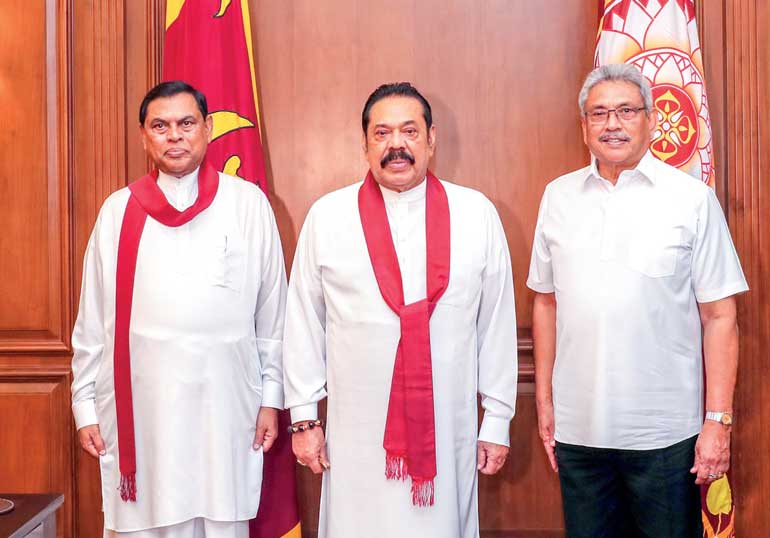
Just two years into Gotabaya-Mahinda-Basil rule, there appears a greater disconnect between the ruling family and
ordinary Sri Lankans. File photo
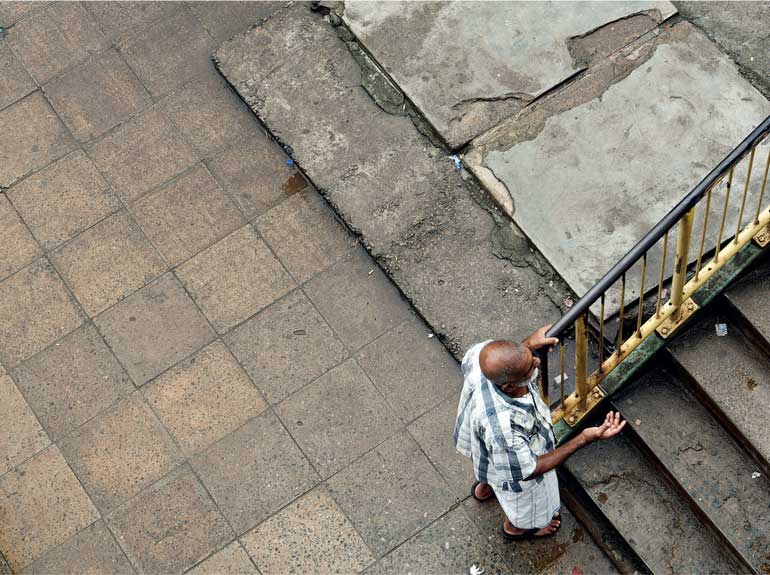
by Tisaranee Gunasekara
“There is something in human history like retribution; and it’s a rule of historical retribution that its instruments be forged not by the offended but by the offender himself.”
Marx (The Indian Revolt)
The 2015 presidential election; as analysts and astrologers proclaimed and predicted a Mahinda Rajapaksa victory, a beggar in Galle made a bet that the winner will be Maithripala Sirisena. At the 2010 presidential election, the beggar had voted for Mahinda Rajapaksa. In the after years, whenever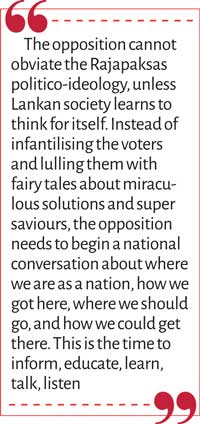 President Rajapaksa, Defence Secretary Rajapaksa or Parliamentarian Rajapaksa was scheduled to go by, the police would forcibly herd all beggars out of the royal-sight. From this personal experience, the beggar in Galle extrapolated a national truth: the Rajapaksas were insulating themselves from the living reality of ordinary people; such a disconnect cannot but lead to eventual electoral defeat.
President Rajapaksa, Defence Secretary Rajapaksa or Parliamentarian Rajapaksa was scheduled to go by, the police would forcibly herd all beggars out of the royal-sight. From this personal experience, the beggar in Galle extrapolated a national truth: the Rajapaksas were insulating themselves from the living reality of ordinary people; such a disconnect cannot but lead to eventual electoral defeat.
Just two years into Gotabaya-Mahinda-Basil rule, an even greater disconnect is developing between the ruling family and ordinary Lankans.
Whether those at the milk-powder queue near the Jubilee Post hooted at the passing presidential motorcade - or not - is moot. What matters is the aftermath.
Following the ‘incident,’ the Mirihana police descended on the outlet in force. This visitation gave rise to another spate of rumours. The police issued a statement saying that the President had wished to discover why there was a queue outside a milk-powder outlet. The police visitation was actually a fact finding mission.
Is the President of the Democratic Socialist Republic of Sri Lanka, the man endowed with near supreme powers by the 1978 Constitution, unaware that there is a severe milk powder shortage in the country?
By the same token is he also unaware that the country is being plagued by other shortages, from gas and vegetables to cement and affordable rice?
Or are the police lying to cover up for their master? Did the police intervene to prevent their master’s sensibilities from being assailed by the unseemly sight of the return of the era of queues (polim yugaya)?
According to the police statement, the queue was not caused by a milk powder shortage; the real reason was a delay in issuing milk powder due to a shortage of sales windows and sales points. So the police had asked the milk powder company to establish many more sales points.
If this is how the Rajapaksas understand national problems and respond to them, 2022 is going to be an infinitely worse year than even 2021.
On the last day of 2021, a TV station interviewed a young woman at a gas queue in Matara. Seated on her empty gas cylinder with a slumbering toddler cuddled in her arms, she explained that from there, she’d be going to the milk powder queue. 
The internet carried a copy of an application by a state employee asking for leave to stand in gas and milk powder queues.
Hans Christian Anderson’s story, Emperor’s New Clothes, has precedents across the globe, including in our own country. According to the Lankan version, seven men undertook to weave a unique copper-coloured silk robe for a king. The robe will be visible only to those well-born, they said. Once the ‘weaving’ was complete, the men got the king to divest himself of all his clothes. Afterwards, they “surrounded the king and told him that they were putting on the copper-coloured silk clothing. They stroked his head, saying that they were putting on the crown. They stroked his arms, saying that they were putting on the jacket... Then they brought forth the elephant, seated the naked king upon it, and started him on his procession throughout the city.” No one pointed out the king’s true state, for fear of being considered ‘low-born.’
In Sri Lanka of today, the royal family is naked. But unlike in the stories, the people are calling them out, pointing fingers, laughing, maybe even hooting...
Provincial elections in the air?
The Rajapaksas have an almost childlike love for over-the-top accolades. Fortunately for them, the Sinhala-Buddhist Sangha seems to possess an inexhaustible store of such exotic name-boards. In his time, many such honours were bestowed on President Mahinda, starting with ‘Universally Renowned Lord.’
This week, it was the turn of President Gotabaya. He was made ‘Sri Lankadheeshwara Padma Vibhushana’ (Lord of Sri Lanka Lotus Decoration/Ornament would be a rough translation) by the Kotte Sri Kalyani Samagri Dharma Maha Sangha Sabha. Accepting the ‘title,’ the president made a statement that hints at how the family aims to get out of the unpopularity mire they are sinking into: “When I was sworn in as the President in front of the Ruwanweli Maha Seya, I said that I am a President who was elected by the votes of a majority of the Sinhalese. I firmly believe that protecting the heritage of Buddhists who made immense sacrifices for me to become the first citizen is my prime responsibility.” (Whether empowering the likes of Galagoda-Atte Gnanasara – who recently expanded his thuggery by threatening physical violence on two fellow monks – is a part of protecting Buddhist heritage is another matter.)
In the last fortnight, the SLPP suffered budget defeats at Ja-ela Urban Council (by two-thirds), Ratnapura Pradesheeya Sabha, and Lindula Urban Council (for the second time). In this context, the sudden transformation of Basil Rajapaksa into a slightly out of season Santa Claus is intriguing. Fresh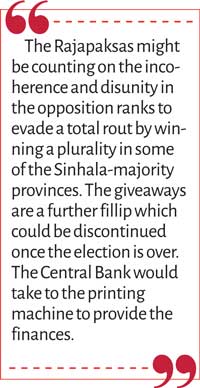 from his American vacation, he presented a cabinet paper containing a list of giveaways to key population groups, from state sector employees to the military. Perhaps the secret lies in his planned second visit to India. PC polls (at least in the North and the East) might be part of the price the Rajapaksas have to pay to obtain urgent financial assistance from Delhi.
from his American vacation, he presented a cabinet paper containing a list of giveaways to key population groups, from state sector employees to the military. Perhaps the secret lies in his planned second visit to India. PC polls (at least in the North and the East) might be part of the price the Rajapaksas have to pay to obtain urgent financial assistance from Delhi.
The Rajapaksas might be counting on the incoherence and disunity in the opposition ranks to evade a total rout by winning a plurality in some of the Sinhala-majority provinces. Racism would be used to sow fear and hate in Sinhala minds. The giveaways are a further fillip which could be discontinued once the election is over. The Central Bank would take to the printing machine to provide the finances.
If racism and (some) relief turn out to be inadequate, there is repression.
On December 31st 2021, a horde of CID officers descended on the home of Asha Dilrukshi Perera and demanded that she accompany them to the CID. Her crime was sharing a social media post about the Jubilee Post incident. Ms. Perera, who was tending to her differently-abled child, begged for time. But ‘insulting the president’ was obviously too grave a crime to permit such compassion. She was questioned and warned not to share such posts as the CID would be keeping an eye on her. Instead of being cowed into silence, Ms. Perera went public with the story.
The police promptly issued another statement declaring their intent to apprehend anyone insulting the president on social media or any other media.
The threat brings to the mind the arrest of nine journalists attached to Sri Lanka Mirror and Sri Lanka X News in June 2012. They were accused of insulting President Mahinda and inconveniencing the government. When the original charges turned non-viable, the CID tried to accuse them of pornography! The case was eventually dismissed. Are the police planning to revive that past?
Attorney-at-law Thishya Weragoda responded to the police threat by quoting from a Supreme Court decision, Wahalathanthri v Inspector General of Police, “To cause any annoyance or embarrassment to a Head of State or Government will not form the basis of a prosecution under Section 120 of the Penal Code. The essence of Section 120 is whether the words in question incite the people to commit acts of violence and disorder and not whether the words are defamatory or not.”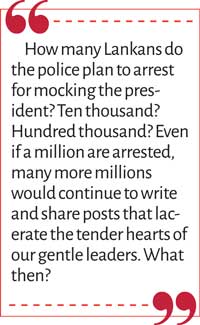
Quite apart from the legal implication of such abusive practices, how many Lankans do the police plan to arrest for mocking the president? Ten thousand? Hundred thousand? Even if a million are arrested, many more millions would continue to write and share posts that lacerate the tender hearts of our gentle leaders. What then?
Repression could also take unofficial forms, as is already happening in the North and the East. Take for example, the brutal attack on journalist Vishwalingam Vishwachandran on November 29. He was taking a picture of the Mulliwaikkal name-board when he was assaulted, reportedly by members of the army, with a palm stick (thal pitta) wrapped with barbed wire. In other portentous moves, the president gazetted a new detention centre in Colombo 5 for those held under the PTA; and a monk-led protest against Dr. Shafi Sahabdeen was held in Kurunegala.
But what can really work in the Rajapaksa favour is a state Walter Benjamin in his essay One Way Street called ‘stabilised wretchedness,’ the perception of “the phenomena of decline as stability itself and rescue alone as extraordinary verging on the marvellous and incomprehensible.” A pernicious new normal.
Imagining an Afterlife
The Conference of Birds is a 12 Century epic poem by the Persian poet Farid ud-Din Attar. The birds decide to ask the Simorgh (Persian version of the phoenix) to be their king. But when they eventually reach the distant home of that legendary bird, all they find is a lake in which they see their own reflections.
Leaders are often a reflection of the people who choose them and sustain them, especially in a democracy.
For example, the Kelani Cobra myth worked, despite its utter silliness, because over the years, superstition has turned respectable. Superstition, a hidden factor in Lankan politics, became overt under Rajapaksa rule. President Mahinda had an ‘official’ royal astrologer who boasted of his doings to the media (including international media). President Mahinda also openly carried a golden-hued talisman. State media used astrologers as political analysts, a practice copied by private media. During the 2019 presidential election campaign, Candidate Gotabaya and brother Mahinda attended the Shanthikarmavedinge Jathika Sammelanaya, a gathering of kapuwas, exorcists and astrologers.
When the ruling elite sport the symbols of their superstitions as badges of honour, ordinary people tend to follow suit. A cycle of ignorance and unreason comes into being with leaders and people reinforcing each other’s mythical beliefs, and the most idiotic lies appear as incontrovertible, divine truths. If this mindset prevails, it will make it easier for the Rajapaksas – or a future saffron-khaki alliance with or without the Rajapaksas – to gull the masses again.
“If we can’t think for ourselves, if we’re unwilling to question authority, then we are just putty in the hands of those in power,” Carl Sagan warned (The Demon-Haunted World). The opposition cannot obviate the Rajapaksas politico-ideology, unless Lankan society learns to think for itself. Instead of infantilising the voters and lulling them with fairy tales about miraculous solutions and super saviours, the opposition needs to begin a national conversation about where we are as a nation, how we got here, where we should go, and how we could get there.
In this sense, the policy proposals by the National Movement for Social Justice (formed by the late Sobhitha thero and currently led by Karu Jayasuriya) and the JVP/NPP are positive interventions. Whatever the pros and cons of these proposals, their very existence means that a reasoned conversation can begin about the current national calamity, a better future and the least damaging path from one to the other. Hopefully, other political parties and organisations too would come up with their own ideas about the past, present and future. As Thomas Picketty reminds us in Capital and Ideology, ideological and intellectual transformations precede and pave the way for political ones.
The stretch of road from the Jubilee Post to the turn off the president’s house is ‘beautified’ with massive flower pots on either side, providing pleasing prospects to presidential eyes. When reality obtrudes, as happened near the milk powder outlet, the Rajapaksa reaction is not to acknowledge the problem, but to insist that all signs of the problem, be they beggars in Galle or queuing consumers in Mirihana, be swept out of their sight, like so much debris. The opposition’s task is the opposite – keep the slogans and the posturing for elections. This is the time to inform, educate, learn, talk, listen... Remember the beggar from Galle who trumped the analysts and the astrologers because he saw and thought through what was happening.